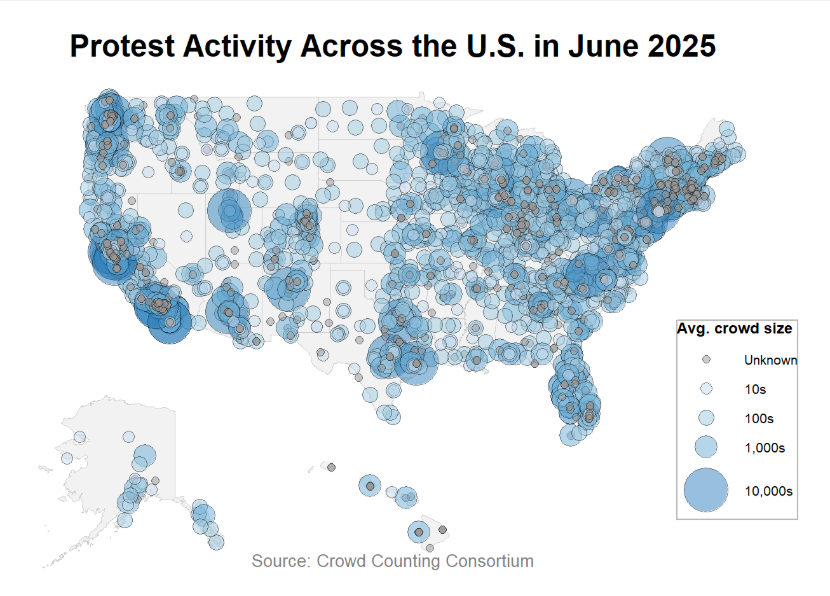Why your neighbors need you to oppose fascism

There’s still almost a month left in summer—officially. Still, these August doldrums feel a bit like the period after the election and before an inauguration, an artifact of calendars that were made up before even the telegraph was imagined.
Because we know the fun is over. Kids are slouching back to school. Our fascist manbaby is promising to send more soldiers to more cities, hoping to create the crisis that will quiet the Klan rally and Epstein Files in his brain. And the big protests are starting up again, most notably Workers Over Billionaires on Labor Day, September 1.
So I wanted to take a moment of shifting momentum to look at what we’ve lost and achieved in 2025. Hopefully, all my words will swell symphonically into a clear sense of why what we do next may matter more than anything we do in the rest of our lives.
We are here
It’s always worth remembering that we may never be as free as we are today. And the risks of protesting and non-cooperation may never be lower.
That latter point is a constant refrain of NEXT COMES WHAT, Andrea Pitzer’s podcast about taking insights from the history of concentration camps to oppose Trump and his allies most effectively. If you follow me at all, you know that I produce this podcast and can’t shut up about it because I’m as proud of it as any work I’ve done in my life.
Growing up in a conservative temple in the 1980s, surrounded by Holocaust survivors and their families, and then finding the brilliant Facing History curriculum as a young teacher, convinced me that eventually the camps would come for us. I regret to inform you that my paranoia was right, or perhaps it was not paranoia at all. The regime is building the most ridiculously over-funded concentration camp system in human history with our dimes. It’s a system that aspires to exist without borders or any morality other than the virtues of reaffirming crusty hierarchies.
There’s no conceivable goal it could accomplish, other than terrifying citizens and immiserating everyone else it touches. The point is, as Adam Serwer says, cruelty. And cruelty is rarely satisfying. History tells us that these sorts of systems never shut down on their own, and even when they do, the crevices they found in our collective soul often continue to abet atrocities.
So it falls to us, those cursed with caring.
You may be like me, someone who has constantly wondered, probably because the question was literally asked of me when I was only six or seven, “What would I have done in 1930s Germany?” Apparently, my answer is “I’d be doing a podcast spreading the wisdom and warnings of one of the planet’s leading experts on concentration camps.” I guess I just was made for these times.
So what’s our answer?
Many of us—immigrants, trans people, anyone who can get pregnant, people who work at an organization that depends on federal funding—are already far less free than we were just a few years ago. And there should be no one who doubts that the show trials Trump test run his first time around will be a constant and elevating preoccupation of this newer regime. They may get better at rounding up and silencing anyone who opposes them, from John Bolton to your kids’ second-grade soccer coach. Or it might not matter how bad they are at it because they have so much money, so much power, and so much support from America’s elite.
This is where I remind you of the greatest disaster of the early stages of this regime—the utter failure, with few exceptions, of America’s most powerful people and institutions to show any loyalty to America’s loftier aspirations. The collapse of big law firms, the floundering of the most powerful universities, and the senseless failure of our corporate-captured media to at least show the survival instincts of a slug will forever be a massive stain on our souls. And it portends to far greater catastrophe.
I’d be catatonic with worry if not for the people, people like you.
The story that will win
The failure of the elite has helped to drown out the story of 2025, which is the story of one of the most visible and persistent resistance movements since the Iraq War, at least.
This resistance is much larger than in 2017, and it sizzles with remarkable spirits innovating to help their neighbors and build the community that is the best antidote to fascism.
We now know that the No Kings protests at the beginning of this summer were one of the biggest days of protest in US history and comparable to the Women’s March. But what was new is how dispersed and constant the demonstrations have been, with Tesla Takedowns continuing weekly months after Elon Musk officially left the regime.
“Whereas the 2017 Women’s March involved actions in over 650 locations, No Kings saw events in over three times as many locations, with events organized in big cities, small towns and places in between,” Erica Chenoweth, Soha Hammam, Jeremy Pressman, and Christopher Wiley Shay of the Crowd Counting Consortium report.
And that one event has blossomed into the remarkable 1,955 gatherings in 49 states as part of No King’s One Million Rising movement.
Why does this matter?
This leads me to my new theory of fighting fascism that came from editing a recent episode of NEXT COMES WHAT.
In her discussion about how America became the villain of our story, Andrea described a visit Kurt Vonnegut had made to her college in her freshman year. In his lecture, Vonnegut warned against giving a villain a backstory, an endeavor Andrea had devoted the entire episode to.
This narration sent me searching for footage of Vonnegut talking storytelling, which is the kind of happy joy that often comes from working with Andrea, along with combing through nightmares of gulags and refugee detention.
Like so many who went to college in 20th-century America, Kurt Vonnegut bent me. Slaughterhouse-Five in particular bent me against war (in a way that almost seemed gratuitous in the mid-90s). In retrospect, I can see how he also guided me toward a need to find some mutable meaning in absurdity, even one of the worst firebombings ever committed by man.
So when I found a Vonnegut lecture delivered at Case Western University at the height of the Iraq War, I was sure I’d find some footage we could use. He only touches on current events for two moments. He says George W. Bush hates Arabs because they invented Algebra, a joke I’m not sure he wrote, but I’ve heard dozens of times. And he complains about the “dirty rats” who make Pall Malls because they haven’t killed him yet because “The last thing I ever wanted was to be alive when the three most important, most powerful people on the face of the Earth were named Bush, Dick, and Colin.” Followed by [LAUGH] [APPLAUSE].
There wasn’t much about villains, but during his famous dissection of story arcs from a scientific perspective, he made a point that I will carry with me to the grave.
“We are so seldom told the truth. And Hamlet in Hamlet Shakespeare tells us we don't know enough about life to know what the good news is and the bad news is, and we respond to that. Thank you, Bill… We pretend to know what the good news is and what the bad news is, and you think about our training in this matter. All we do is echo the feelings of people around us.”
We don't know enough about life to know what the good news is and what the bad news is. That’s why we all push around polls hoping to confirm our hunches and batter people over the head with them.
We can’t be sure what’s fearsome or what’s overreach. We don’t really know why people find the Good News in a guy who’s closer to the antichrist than anything in the Bible. And we can only imagine what will wake them up to what's so obvious we can't stop seeing it.
So, where do we look for certainty or even a hint of it? Around us.
Everything we do makes it easier for our neighbors to stand up or sit down for this regime. We all know there’s a crisis coming that will force all who pay attention to make a choice that could define the rest of their lives.
Will people do it? In most cases, it depends on what they see us doing next.
THE FARCE fights fascism with fearlessness. Subscribe to fuel the Farce—free or paid, your support matters.
If you appreciate the work, drop us a tip to support our work.

Member discussion